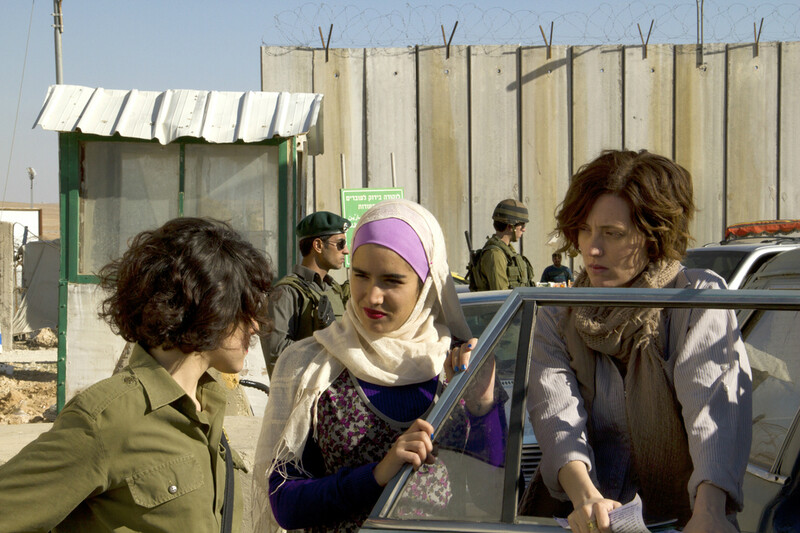The Electronic Intifada 23 September 2013

A scene from Inch’allah. (Happiness Distribution/uniFrance Films)
Many white people travel to Palestine to work with various organizations. Some are deeply involved in solidarity and resistance work on the ground, others work to subsidize Israeli repression of Palestinians through absorbing costs — such as health care — that Israel, as the occupying power, would otherwise have to bear. One of the latter is Chloé (Evelyne Brochu), the main character in Québécois writer/director Anaïs Barbeau-Lavalette’s second feature film, Inch’allah.
Titled with Arabic expression meaning “God willing,” Inch’allah opens with a young Jewish boy walking through a Jerusalem market. He stops to look at some birds for sale after which an explosion — implied as a bombing — is a heard but not seen. This narrative is dropped until the very end of the film and the story of Chloé begins.
Chloé is a young doctor from Quebec, working at a women’s health clinic run by a foreign organization in Palestine.
The story is reasonably straightforward. Chloé rents an apartment in Jerusalem and is close to her French-speaking Israeli neighbor, Ava (Sivan Levy). Ava is a soldier deployed daily at a checkpoint which is said to be Qalandiya, through which Chloé passes daily.
Chloé has also grown close to her pregnant client Rand (Sabrina Ouazani), a ragpicker who lives in the Qalandiya refugee camp with her brother Faysal (Yousef Sweid). Faysal runs a print shop and, the film hints quite heavily, may also be part of an armed resistance group. Rand’s husband is incarcerated in an Israeli prison awaiting sentencing.
Intimacy
Chloé finds that as she grows closer to Rand and Faysal, she becomes more outraged at Israeli actions (this despite the film refusing to articulate much in the way of specific political critique) and her relationship with Ava grows tense, though not damaged in any irreparable way. She uses her friendship with Ava to facilitate day permits for Rand, Faysal and their mom to visit the village from where their family originates.
That scene has one of the film’s finer comic moments when their mother, atop the remains of her childhood home, convincingly identifies where the bathroom was.
The tension in Chloé’s life between her friendships with “both sides” builds to the film’s improbable conclusion.
Barbeau-Lavalette has filmed Inch’allah with tremendous intimacy using a hand-held camera that closely orbits Chloé. It gives the film an organic, participatory feel for the audience.
Barbeau-Lavalette also has a gift for creating beautiful sequences, such as a memorial gathering with an oud player and vocalist. The scene is framed with candlelight and martyr posters while focusing on the music, musicians and those gathered in equal parts. This gives terrific context to the on-screen performance, and invokes a working class, refugee version of the Brazilian singer Caetano Veloso’s turn in Pedro Almodóvar’s haunting 2002 rape apologia Hable Con Ella (Talk to her).
Despite the slew of great performances, fine contrasts of comedy and drama and outstanding direction and photography, Inch’allah is ultimately flawed.
No “permission to narrate”
The drama and trauma build throughout the film, all of it inflicted upon Palestinians. Faysal and Rand both offer occasional sharp political comments, one of which moves toward a critique of film’s own voyeurism during the scene in the ancestral village.
But Palestinians, by and large, do not narrate the trauma or injustice. Instead, Chloé takes their place. Indeed, she is not a sympathetic Westerner with Palestinian friends, but instead their substitute for a Western audience. It is Chloé who narrates the violence of Zionist settler colonialism — however, unexamined entirely during Chloé’s frequent Skype conversations with her mother in Quebec, is the violence of Canadian settler colonialism. Her home is portrayed as perfectly tranquil.
Palestinians are still denied, as Edward Said noted back in 1984, “permission to narrate.” Chloé is the mourning mother, the outraged brother, the frustrated commuter. Ava too narrates the trauma of the checkpoint from the point of view of the “shooting and crying” Israeli.
It is ironic, if unsurprising, that Chloé’s frustration about French-language radio not reporting violence against Palestinians is reproduced by the film itself. In Inch’allah, Palestinian voices aren’t even deemed necessary to critique the absence of Palestinian voices. This is a prime example of the harm in “giving voice to the voiceless,” the sole enduring achievement of which is the perpetuation of voicelessness.
Finally, why is the film framed with a suicide bombing? Leaving aside how Inch’allah misconstrues the reasons why this tactic has been used, it offers nothing to the story.
It is especially curious when the film’s characters note there have not been such bombings for years. The humanistic portrayal of the attacker — who is given the same sympathy as every other character — is somewhat irrelevant when stories of Palestine are attached at the hip to suicide bombings (a phenomenon broken down insightfully in Evelyn Alsultany’s terrific 2012 book Arabs and Muslims in the Media).
As a film about a white Canadian doctor in Palestine struggling to choose a side, Inch’allah is a deeply problematic story, told beautifully.
Jimmy Johnson is an organizer in Detroit.






Comments
Very confused criticism. On
Permalink Rafael FS replied on
Very confused criticism. On the one hand, it accuses the film of having a Westerner as the focal point of attention throughout the movie, and on the other, the author accuses it of focusing solely on Zionist colonialism, ignoring Canadian settlers, as if one's only authorized to shed light on the ethnic cleansing of Palestine in case the plight of other native populations throughout the world is mentioned as well.
To clarify then
Permalink JJ replied on
Rafael, I have no problem with the film being about a white Canadian in Palestine. I do have a problem with the trauma of Zionism being narrated through this person instead of channeling/supporting Palestinian voices. Second, the problem of ignoring Canadian settler colonialism comes up only because of the way Canada is portrayed in the film. There is no contradiction or confusion here.
Western filmmakers will
Permalink Froy replied on
Western filmmakers will always find it easier to show their stories from the point of view of a fellow Westerner (Dances with Wolves, A Man Called Horse, The Children of Huang Shi...). Not only they can understand better the character, but they also feel their audiences (mainly Westerners) will also relate better and feel more identified with another Westerner. It might not be the bravest thing to do, but you can't really trash the whole film just for that, if it actually shows an accurate portrayal of the conflict, and has its heart in the right place.
Trashing trashy films
Permalink JJ replied on
Hi Froy. The point, again, isn't that the lead was Canadian. That's no big deal. Nor is it a big deal that it is set in Palestine. Plenty of ethical stories to be told about foreigners living or working in Palestine. The problem is that Chloe narrates Palestinian trauma. The film actively removes Palestinian agency and empowers white voices to speak for Palestine. Palestinians are perfectly capable as narrators to white audiences and continue to be successful doing so, even while swimming against the widespread white supremacy that values Jewish - especially Ashkenazi - voices over those of Palestinians. Cooperating with systemic racism isn't a matter of 'brave', it's a matter of racism. And for what it's worth, progressive indigenous activists tore apart that horrible film Dances With Wolves. They did so for many reasons, including some alluded to in the review above.
Orientalism is such a drag.
Permalink Anonymous replied on
Orientalism is such a drag. Not just the obvious kind, but also the form in which the native is the only legitimate truth teller. How very anti-colonial colonial. A human story can be rendered by another human and whether it works or not is up to the skill of the author. PS "white" is not necessarily an antonym of "Arab" (Arabs have called themselves and been called all colors over the years -- with and without explicit political intent). Though for creating a mystical East which "whites" can only subjugate intentionally or unintentionally and always in defilement of the pure and naturally unaffected Native, it is crucial to establish this opposite. Perhaps the film would have been better drama told through a Palestinian voice, that is a different (and imo fairer) kind of criticism.
The political critiques the
Permalink JJ replied on
The political critiques the film makes are told through Palestinian, Israeli and Canadian voices. All of those points are alternately well or poorly written by the film's Canadian director. I did not say that Canadians can't have opinions about or critiques of Zionist settler colonialism and Palestinian resistance (or other Israeli and Palestinian stories not explicitly related to liberation and oppression). My problem with the film is explicitly noted above, that the author actively removes Palestinian agency through narrating virtually all trauma through the Canadian doctor Chloe. This is at least partially to blame for the incoherent and fetish version of the suicide bombing narrative.
And yes, Palestinians historically and presently are racialized in all kinds of ways. The otherness engaged in the film and in interviews with the director is clearly defined in the film as an 'us' (white European) 'them' (Palestinian) narrative, mostly through a blind (for Chloe) neutrality of a white supremacist normativity. The films moves towards a critique of this at a couple of moments but always steps back.
made me think
Permalink Amanullah Kariapper replied on
Hi Jimmy,
Thanks for this review. Until I read it, I wasn't quite able to pin down what bothered me about the suicide bombing plot element. Even now, I'm not fully clear on it.
Apart from that, however, I really liked the film. One might argue that it's because I'm a brown sahib myself, a colonised subject still. But really, I thought that it effectively communicated the confusion as well as the hypocrisy of Western aid workers/humantarians in Palestine - they cannot help feeling solidarity with the Palestinians, yet are utterly unable to relax in a Palestinian home, partake of Palestinian culture and need to escape to Israeli nightclubs, so much more similar to "back home". And hence, cannot escape the trap of falling back into treating Palestinian as recipients of their charity, as opposed to standing with them, locating themselves squarely in their camp.
You're probably right that the film could have done a better job as a platform for self-narrated Palestinian perspectives. Yet, for me, it's not a strong enough criticism that I'd see no value in the film at all. I have a feeling, in fact, that it's the kind of film that would prompt serious reflection among well-meaning and similarly shocked and confused Western solidarity activists who spend/have spent time in Palestine. Or serve as an excellent introduction for what awaits them - and help them position themselves in a more coherent manner. Or even help an otherwise indifferent-to-unsympathetic Western audience (I find that a lot of people in the West manage to retain a relatively tribal/communitarian mindset even now) get some insight into the complexity of the situation as well as the naked brutality of the occupation.
On another track, in discussing the film with friends, we had to wonder to what extent the film was autobiographical. Which would explain the almost obsessive focus on Chloé. If not justify it entirely - I give you that.
Just some thoughts. Thanks for the critique. It helped me to think about the filmt. I'll try to get my hands on the book you mention.
Salaam,
Aman